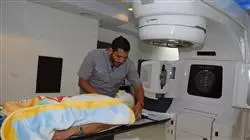University certificate
The world's largest faculty of medicine”
Description
Update your knowledge of the latest procedures in the management of tumors of the central nervous system with this specialist program”

Advances in the study and treatment of tumors of the Central Nervous System are becoming more and more widespread. However, there is still a long way to go for us to increase the survival rates of patients with this type of cancer.
Tumors of the head and neck, also known as ENT, are some of the least common. However, their scarcity doesn’t mean that we should invest fewer resources into researching them, since advances in this area would lead to increased survival rate among patients affected by this type of cancer.
But as well as having the necessary technological advances to treat patients, is is equally as important that healthcare professionals have the ability to make a proper diagnosis from the very beginning. Therefore, it is essential that they have all the information and updated training to provide personalized and effective care to their patients.
In this Postgraduate diploma we delve into the knowledge of radiotherapy in patients with tumors of the central nervous system and ENT, with the possible effects that such treatment with radiotherapy can cause. In this way, medical professionals will update their knowledge of the different types of tumors of the Central Nervous System and ENT.
Another of the highlights of this course is the development of knowledge of pain and malnutrition in oncology patients.
In short, this Postgraduate diploma provides oncology professionals with the keys for the use of the main advances in Radiotherapy Treatment of Tumors of the Central Nervous System and ENTT which will help them to evolve in their profession and to keep up to date with recent research in this field of oncology.
Improve your clinical skills through this program in Radiotherapy Treatment of Tumors of the Central Nervous System and ENT”
This Postgraduate diploma in Radiotherapy Treatment of Tumors of the Central Nervous System and ENT contains the most comprehensive and up-to-date scientific program on the market. The most important features of the program include:
- Development of more than 75 clinical cases presented by experts in Radiation Oncology
- The graphic, schematic and eminently practical contents of which they are composed provide scientific and practical information on the disciplines that are essential for professional practice
- Diagnostic-therapeutic developments on assessment, diagnosis and intervention in tumors of the central nervous system and ENT
- It contains practical exercises where the self-evaluation process can be carried out to improve learning
- Clinical and diagnostic imaging and testing iconography
- Algorithm-based interactive learning system for decision-making in the presented clinical situations
- With special emphasis on evidence-based medicine and research methodologies in Radiation Oncology
- All of this will be complemented by theoretical lessons, questions to the expert, debate forums on controversial topics, and individual reflection assignments
- Content that is accessible from any fixed or portable device with an Internet connection
This Postgraduate diploma may be the best investment you can make when choosing a refresher program for two reasons: in addition to updating your knowledge in Radiotherapy Treatment of Tumors of the Central Nervous System and ENT, you will obtain a Postgraduate diploma from TECH Global University"
The teaching staff includes professionals from the field of Radiation Oncology, who bring their experience to this training program, as well as renowned specialists from leading scientific societies.
The multimedia content developed with the latest educational technology will provide the professional with situated and contextual learning, i.e., a simulated environment that will provide an immersive training program to train in real situations.
This program is designed around Problem Based Learning, whereby the physician must try to solve the different professional practice situations that arise during the course. For this purpose, the physician will be assisted by an innovative interactive video system developed by renowned experts in the field of Radiation Oncology with extensive teaching experience.
Increase your confidence in decision making by updating your knowledge through this program"

Make the most of the opportunity to learn about the latest advances in Radiotherapy Treatment of Tumors of the Central Nervous System and ENT and improve your patient care"
Syllabus
The structure of the content has been designed by the best professionals in radiation oncology who work in centers of national reference. This experts are aware of the need for training in the world of medicine in order to advance in radiotherapy treatment of tumors of the central nervous system. That is why they offer this quality training adapted to new educational technologies, so that health professionals can provide the best medical care, adapting it to the needs of their patients.

It includes clinical cases to bring the program content as close as possible to the reality of medical practice”
Module 1. Basis of Radiotherapy Treatment Radiobiology
1.1. Biological Effects of Ionizing Radiations
1.1.1. DNA Damage
1.1.2. Non-Clonal Effects
1.2. Dose Fractionation
1.2.1. Linear-Quadratic Model
1.2.2. Time Factor in Radiotherapy
1.2.3. Altered Subdivisions
1.3. Oxygen Effect and Tumor Hypoxia
1.4. Radiobiology of Brachytherapy
1.5. Effects of Irradiation on Healthy Tissues
1.6. Combination of Irradiation with Drugs
1.7. Predictive Assays of Response to Radiotherapy
1.8. Radiobiology of Re-Irradiation
1.9. Effects of Irradiation on the Embryo and Fetus
1.10. Radiation-Induced Carcinogenesis
Module 2. Update of Radiotherapy Treatment in Central Nervous System Tumors (Adults)
2.1. Low-Grade Gliomas
2.2. High-Grade Gliomas
2.3. Benign Brain Tumors
2.3.1. Meningiomas
2.3.2. Vestibular Schwannoma
2.3.3. Neurinoma
2.4. Pituitary Tumors
2.4.1. Non-Functioning Adenomas
2.4.2. Prolactinoma
2.4.3. GH-Producing Adenoma
2.4.4. Cushing's Disease
2.4.5. TSH-Secreting Adenomas, GnRH-Secreting Adenomas
2.4.6. Pituitary Carcinomas
2.5. Spinal Cord Tumors
2.5.1. Astrocytoma
2.5.2. Ependymoma
2.5.3. Meningioma
2.5.4. Chordoma
2.5.5. Chondrosarcoma
2.5.6. Miscellaneous Spinal Tumors
2.5.7. Spinal Cord Compression
2.5.8. Medulloblastoma
2.5.9. Craniopharyngioma
2.6. Orbital, Ocular and Optic Nerve Tumors
2.6.1. Rhabdomyosarcoma
2.6.2. Pineal Gland Tumors
2.6.3. Orbital Lymphoma
2.6.4. Ocular Melanoma
2.6.5. Ocular Metastases
2.6.6. Optic Nerve Glioma
2.6.7. Optic Nerve Meningioma
2.7. Primary Cerebral Lymphoma
2.8. Cerebral Metastases
2.9. Arteriovenous Malformations
Module 3. Update on Radiotherapeutic Treatment of ENT Tumors
3.1. Oral Cavity
3.1.1. Lip
3.1.2. Tongue
3.1.3. Floor of Mouth
3.1.4. Gum
3.1.5. Hard Palate
3.1.6. Retromolar Trigone
3.1.7. Jugal Mucosa
3.2. Oropharynx
3.2.1. Soft Palate
3.2.2. Tonsils
3.2.3. Oropharyngeal Wall
3.2.4. Base of the Tongue
3.3. Nasopharynx
3.4. Larynx and Hypopharynx
3.4.1. Larynx
3.4.1.1. Glottis
3.4.1.2. Supraglottis
3.4.1.3. Subglottis
3.4.2. Hypopharynx
3.4.2.1. Pyriform Sinus
3.4.2.2. Hypopharyngeal Wall
3.4.2.3. Postcricoid Tumors
3.4.3. Epidermoid Carcinoma Variants
3.4.3.1. Verrucous Carcinoma
3.4.3.2. Sarcomatoid Carcinoma
3.4.3.3. Neuroendocrine Carcinoma
3.5. Nasal and Paranasal Sinuses
3.5.1. Nasal Vestibule
3.5.2. Nasal Cavity and Ethmoid Sinus
3.5.3. Maxillary Sinus
3.6. Salivary Glands
3.7. Thyroid
3.5.1. Papillary Carcinoma
3.5.2. Follicular Carcinoma
3.5.3. Spinal Cord Carcinoma
3.5.4. Anaplastic Carcinoma
3.5.5. Primary Thyroid Lymphoma
3.8. Cervical Lymph Node Metastases of Unknown Origin
Module 4. Pain and Nutrition in Radiation Oncology
4.1. General Information on Oncologic Pain
4.1.1. Epidemiology
4.1.2. Prevalence
4.1.3. Impact of Pain
4.1.4. Multidimensional Concept of Cancer Pain
4.2. Characterization of Pain
4.2.1. Types of Oncologic Pain
4.2.2. Evaluation of Oncologic Pain
4.2.3. Prognosis of Pain
4.2.4. Classification
4.2.5. Diagnostic Algorithm
4.3. General Principles of Pharmacological Treatment
4.4. General Principles of Radiotherapy Treatment
4.4.1. External Radiotherapy
4.4.2. Dosages and Fractions
4.5. Bisphosphonates
4.6. Radiopharmaceuticals in the Management of Metastatic Bone Pain
4.7. Pain in Long-Term Survivors
4.8. Nutrition and Cancer
4.8.1. Concept of Malnutrition
4.8.2. Prevalence of Malnutrition
4.8.3. Causes and Consequences of Malnutrition in Oncology Patients
4.8.4. Mortality and Survival
4.8.5. Nutritional Risk Factors in Oncology Patients
4.8.6. Objectives of Nutritional Support
4.9. Cachexia
4.10. Initial Nutritional Assessment in a Radiation Oncology Service
4.10.1. Diagnostic Algorithm
4.10.2. Specific Treatment
4.10.3. General Dietary Recommendations
4.10.4. Specific Individualized Recommendations
4.11. Nutritional Assessment During Monitoring in a Radiation Oncology Service

Postgraduate Diploma in Radiotherapy Treatment of Tumors of the Central Nervous System and ORL
At TECH Global University, we offer you the opportunity to become a Postgraduate Diploma in the radiotherapeutic treatment of tumors of the central nervous system and ENT. Our Postgraduate Diploma program will provide you with the knowledge and skills necessary to face the challenges of this constantly evolving medical specialty. With our online classes, you will be able to access the content from anywhere and at any time convenient for you. This flexible approach allows you to adapt your studies to your own schedule and reconcile your professional and personal responsibilities without compromising your academic growth. The treatment of central nervous system and ENT tumors requires a specialized and up-to-date approach. At TECH Global University, we strive to provide you with the most advanced knowledge in the field of radiotherapy and its specific application in the treatment of these tumors.
Specialize in treating tumors of the central nervous system and ENT.
Our program focuses on understanding the principles of radiotherapy, the most innovative techniques and the application of personalized treatment protocols for each patient. You will learn about the latest technological advances in radiation therapy, including radiosurgery and image-guided radiation therapy. The role of the radiation therapist in the treatment of central nervous system and ENT tumors is essential to provide comprehensive care to patients. With our Postgraduate Diploma program, you will become a highly trained professional to plan and administer radiation therapy treatments accurately and effectively, thus contributing to improve the quality of life of patients. By choosing TECH you will benefit from our extensive experience in medical education and the support of our team of Postgraduate Diploma professors in radiotherapy. In addition, you will have access to state-of-the-art resources and tools that will enrich your learning experience and help you achieve your professional goals. Don't miss the opportunity to excel in the field of radiation therapy: enroll in TECH and gain the knowledge you need to make a difference in the lives of your patients.







